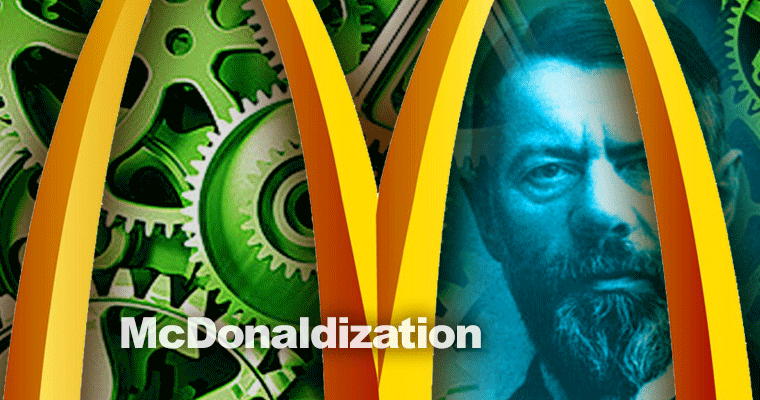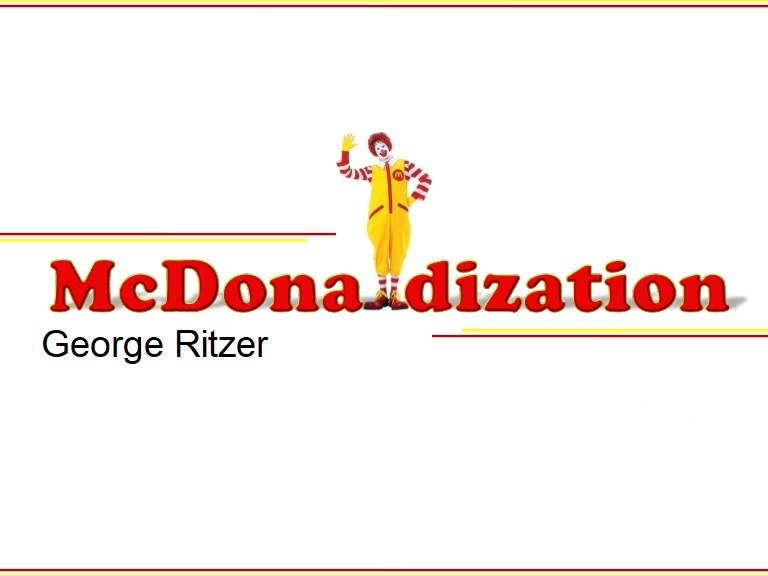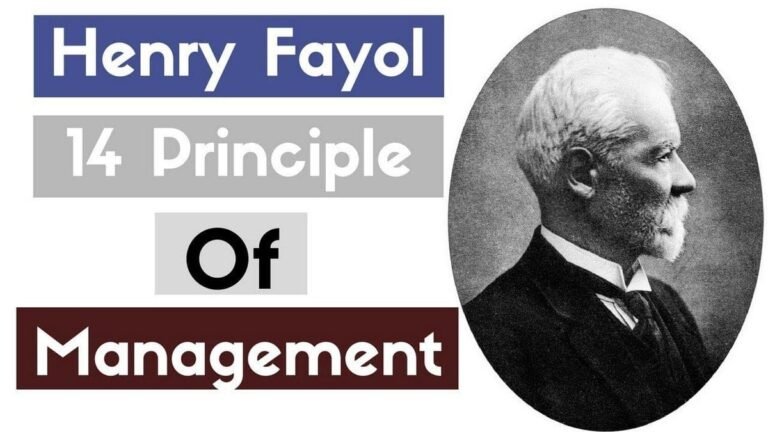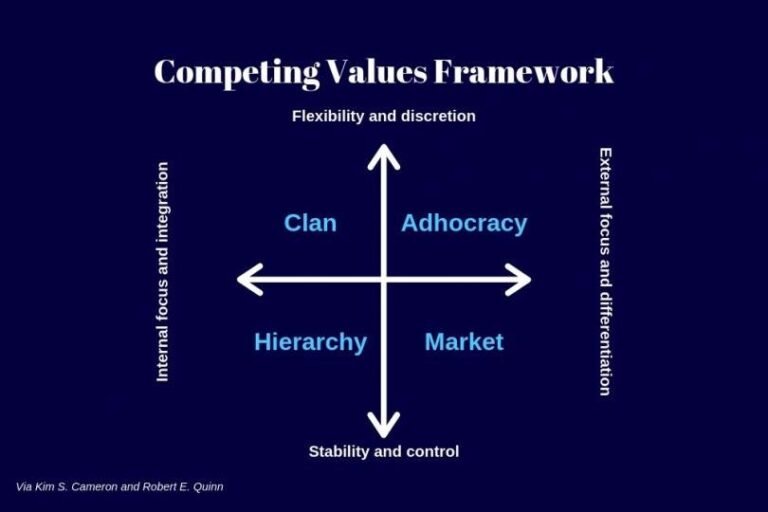George Ritzer McDonaldization Of Society | Examples of McDonaldization
McDonaldization Of Society
McDonaldization is a concept developed in 1993 by American sociologist George Ritzer and refers to the particular kind of rationalization of production, work, and consumption. George Ritzer McDonaldization’s building block is Max Weber’s concept of rationalization, which is replacing traditional and emotional thought with reason and efficiency.
Max Weber’s theory of rationalization became the central organizing force of modern societies throughout the twentieth century. The theory is based on a bureaucratic system defined by hierarchical roles, compartmentalized knowledge and roles, a perceived merit-based system of employment and advancement, and the rule of law’s legal-rationality authority.

What Is McDonaldization in Society?
McDonaldization in society refers to the process by which the tenants and principles that govern and organized McDonald’s and the fast-food industry at large increasingly come to organize and govern society. The principles of rationalization and McDonaldization are the same efficiency calculability, predictability, and control through non-human technologies.
Max Weber and George Ritzer Rationalization
George Ritzer updates Weber’s theories about modernization and bureaucracy to discuss the problems he sees in today’s world. He calls this theory McDonaldization.
Weber argues modernization is characterized by efficiency, predictability, calculability, and control exercised through non-human technology. He argues that we used these things in our quest for rationality; unfortunately, this often leads to the irrationality of rationality. We end up trapped in what he calls the iron cage of bureaucracy.
The irrationality of rationality highlights all the ways that rationality is actually unpleasant to experience.
Max Weber points out things like the dehumanization we experience in bureaucratic structures. The inefficiency that arises from red tape and the lack of flexibility as increasing systemic requirements make things more difficult to accomplish.
Weber argues that the system can become unpredictable as it becomes more complex, and increasingly, we all get very frustrated with non-human technologies.
It’s probably easy for you to think of examples of dehumanization in a bureaucratic system.
💥🎁 New Year & Easter Deals On Amazon !
Don't miss out on the best discounts and top-rated products available right now!
🛒 Shop Now and Save Big Today!*As an Amazon Associate, I earn from qualifying purchases.
Ritzer highlights the unique form that this is coming to take today. He calls it McDonaldization, the process by which the principles of the fast-food restaurants are coming to dominate more and more sectors of American society as well as the rest of the world.
In his more recent work, he highlights the Starbucks effect as well.
George Ritzer McDonaldization Of Society
Principles of McDonaldization
The Business model adopted by McDonald’s in the fast-food industry focuses on the four principles of McDonaldization, namely.
- Efficiency
- Predictability
- Calculability
- Control
These are said to be the most rational forms of running a business and operating within a capitalist system. With rationality, we replace traditional rules with logical and consistent ones.
McDonaldization Efficiency
Efficiency is the optimum method of completing a task. The rational determination of the best mode of production individuality is not allowed. Efficiency means choosing the optimum means to have a given end, which could have many advantages for consumers.
Essentially, it is the quickest, fastest, and cheapest way to produce a product.
In the fast-food industry, efficiency is evident in the assembly line, the production method in which food is created.
For example, pizza, what we would have if someone would take the order. A different person would sauce the pizza.
A different person would mix the toppings and cheese in a bowl then the pizza will get cooked.
Another person would then cut the pizza, and then a different person would deliver the pizza.
💥🎁 New Year & Easter Deals On Amazon !
Don't miss out on the best discounts and top-rated products available right now!
🛒 Shop Now and Save Big Today!*As an Amazon Associate, I earn from qualifying purchases.
Every step of the production of pizza is micromanaged to be sufficient as possible.
We also see efficiency operating in the larger social world when we look at the post-secondary education institution.
For example, university courses are increasingly using multiple standardized tests to test students’ knowledge, which is easy to great and makes.
Instead of using written form tests based on critical and independent thought and actually emphasizing the answers’ quality.
McDonaldization Calculability
Calculability is the assessment of outcomes based on quantifiable rather than subjective criteria. In other words, quantity over quality. Calculability is the notion that bigger is better and value a product’s quantity over the quality.
The way we see calculability operating in the fast-food industry is obvious in the concept of supersizing. The emphasis is placed on getting as much as possible for as little as possible. Even though the quality of fast food is excellent, it’s better to get a lot oven okay, food than a little bit of excellent food.
We can apply the concept of calculability to the larger society by looking at overall consumer practices.
For example, Wal-Mart is built on the promise of getting as much as possible for as little as possible, wherein the point is to buy a large number of things that maybe don’t have the best quality but are cheap.
McDonaldization Predictability
Predictability is when the production process is organized to guarantee uniformity of product and standardized outcomes. It is the comfort that comes from knowing what to expect. It removes stress and insecurity from the interaction.
Predictability is the idea that customers will get exactly the same thing every time they order. They buy, always knowing precisely what they will get.
💥🎁 New Year & Easter Deals On Amazon !
Don't miss out on the best discounts and top-rated products available right now!
🛒 Shop Now and Save Big Today!*As an Amazon Associate, I earn from qualifying purchases.
For example, if you buy a Big Mac in Paris, it will look and taste the same as a Big Mac bought in New Mexico.
We see the axiom of predictability operating in a larger society. When we look at the movie industry, movies often have the same plot lines, same themes, and same actors.
And even when this isn’t the case, we see Sequels, prequels, remakes, movies based on books, movies based on video games, and even movies based on TV shows.
We see the reproduction and reusing of old ideas so that people always know exactly what they’re going to get.
McDonaldization Control
Control is the substitution of more predictable non-human labor for human labor, either through automation or the workforce’s deskilling. Better of the ways to increase control today is through the use of non-human technologies, and in some ways, this could make things more efficient in other ways. It can be frustrating for both customers and workers.
Control is the standardization and control of both employees and customers through non-human and human technologies. Control through nonhuman technology includes, among others, quickly moving customer lines at the counter, limited menus, few options, using robots, in addition to precise directives for the workers to behave and to accomplish their roles.
Examples of McDonaldization in Society
There are several examples of McDonaldization in society today; Some of the examples include;
Example of McDonaldization in Restaurant
Let’s take these four elements and apply them to your experience at a fast-food restaurant.
Efficiency
You know you desire something to be efficient if you have ever complained at a fast-food restaurant because your food was taking too long.
💥🎁 New Year & Easter Deals On Amazon !
Don't miss out on the best discounts and top-rated products available right now!
🛒 Shop Now and Save Big Today!*As an Amazon Associate, I earn from qualifying purchases.
Well, what is too long? One minute, five minutes.
With efficiency, we expect to order an item and have it available right away.
Efficiency also puts more expectation on the customer to do things for themselves, such as get their own beverage or condiments. This is convenient for both the customer and the business.
Predictability
We love what is familiar, and just like the McDonalds where you live, you expect a McDonald’s in another city or country to have either the same menu, items, and atmosphere, or at least something close to it.
Calculability
Let’s face it; you don’t go to McDonald’s because you believe it is the best quality food. Well, why do you go?
In addition to knowing what you will get and getting it quickly, you know you will get a lot of food for a small price.
So, in other words, we go for quantity over quality.
Control
💥🎁 New Year & Easter Deals On Amazon !
Don't miss out on the best discounts and top-rated products available right now!
🛒 Shop Now and Save Big Today!*As an Amazon Associate, I earn from qualifying purchases.
Primarily it’s controlled through non-human technology. The technology ensures that our food is cooked and prepared the same way each time.
This aids in deskilling humans and turns them into employees that can be easily replaced.
But McDonaldization is not just limited to the fast-food industry today. We see it everywhere, from restaurants to banking systems, to higher education. Here are more examples.
McDonaldization of Henry Ford
One of the earliest examples would be Henry Ford and his assembling line for his automobiles. His revolutionary idea dramatically changed how many automobiles could be produced, and it was very efficient.
McDonaldization in Healthcare /Medical care
Medical care is a surprising aspect of McDonaldization. There have been more outpatient procedures conducted in recent years than there ever have been before.
In a study published by the International Journal of Nursing Studies, the results of their study concluded that patients preferred outpatient surgery, and they placed it within the broader societal context of efficiency and speed.
Their time was a major issue for them. Like all other aspects of their life, they wanted surgery to be a speedy process; they compared it to McDonald’s experience with its emphasis on speed, predictability, and control.
This study throws new light on patient experiences and offers an understanding of outpatient surgery against Western culture, emphasizing the importance of speed and efficiency.
It is a popular choice for patients, but it can seem to be a weird, strange way of providing care.
McDonaldization in Education (Higher Education)
Higher education is another aspect of society that has become McDonneldized.
💥🎁 New Year & Easter Deals On Amazon !
Don't miss out on the best discounts and top-rated products available right now!
🛒 Shop Now and Save Big Today!*As an Amazon Associate, I earn from qualifying purchases.
We live in an age of mass higher education in which many students attend college because they see a college education as it means to a more successful career, not necessarily because they love learning.
Colleges and universities are experiencing growing pressure from the public and state legislators to control costs and maximize efficiency.
These governmental and economic changes have contributed to increasing university administrators’ management role and lessening faculty’s independence, including library faculty.
Increased competition for students among many academic institutions has resulted in a new emphasis on marketing and quality of service, intruding students as consumers were even customers.
How have colleges and universities turned into places of McDonaldization?
If you think about it, they focus on efficiency when you take a multiple-choice test out on the computer, which automatically grades your test when you’re done and then enters it automatically into an online grade book, which you can then check any time, day, or night.
Predictability happens when we expect one professor to teach the same way and use similar teaching styles.
Calculability shows up when what we produce in the classroom and what can be measured is the primary focus.
You know this is true when what matters most to you is the grade you receive in the class or your GPA. Is this more important than the process of learning? Can all learning be quantifiable?
Control; Standardized tests and an institution’s rules and regulations on how and what is taught?
💥🎁 New Year & Easter Deals On Amazon !
Don't miss out on the best discounts and top-rated products available right now!
🛒 Shop Now and Save Big Today!*As an Amazon Associate, I earn from qualifying purchases.
Give a certain amount of control and courses developed in a package to be taught by any professor anywhere and outline exactly what needs to be done each class period have a great deal of control.
All of these elements impact the type of education you receive.
Therefore, is McDonaldization a good thing for colleges and universities?
How does it affect the way you learn?
Is McDonaldization even good for society?
And perhaps more important, is how will this affect our future?
McDonaldization in Technology
Technology is another big one. The growing importance of the Internet, especially how service providers are marketing it, is a quick and easy way to instant gratification for pretty much anybody, e. I mean the Internet, you Google something.
You find the answer in no time at all. Quick and easy access to ATM, any sites as possible, and as much information as possible, regardless of its value, is precisely the triumph of quantity over quality.
McDonaldization of Social Media
Social media is a shocking form of McDonaldization in a way. There are many different words for friendships, and, you know, our search for it is even more confusing, strong and weak ties, social networks, and social capital. We have a verb for it to friending.
That’s something our new media technologies allow us to do.
💥🎁 New Year & Easter Deals On Amazon !
Don't miss out on the best discounts and top-rated products available right now!
🛒 Shop Now and Save Big Today!*As an Amazon Associate, I earn from qualifying purchases.
Friending today is a socio-technical practice that involves creating a social networking platform profile and extending an invitation to another profile to become your friend.
It creates very shallow friendships between individuals, since most of the time, it is just at face value on whatever each person decides to share on social media.
McDonaldization of Retail
Another example of McDonaldization is retail.
I’m pretty sure all of us have gone to Walmart and used to self-checkout instead of waiting in line for an actual person to check us out is more efficient, and we don’t have to have that face-to-face awkwardness with someone they’re checking our stuff out.
There have been grocery stores, and even there are some hardware stores have followed the trend of self-checkouts, and it puts more work on the consumer than the employees.
Since there’s usually just one employee for about 8 to 10 self-checkout lanes, they increase their efficiency, and also, they don’t have to pay more people to do checkouts for their customers.
McDonaldization Problems / Criticism of McDonaldization
The Irrationality of Rationality.
Ritzer highlights many of the problems with the irrationality of rationality that emerged in a McDonaldization system.
- Inefficiency; Sometimes, you end up standing in very long lines for fast food or ATM machines.
- High costs; While it seems like you’re getting a great deal on that soda, you’re actually paying considerably more than it’s worth.
- False friendliness means that workers are forced to enact friendliness no matter how they’re feeling and how customers treat them.
- Disenchantment that much of the magic and enchantment that came from the uniqueness of situations in the world is taken away when everything goes according to a manual
- Health and environmental hazards; Even though fast-food restaurants are now making their food “healthier,” we know that there are many problems with it.
- Homogenization; We tend to see more of the same products everywhere.
- Dehumanization; employees just become plug-in parts, as do customers.
- Ritzer also points out how these things undermine our family experiences, educational experiences, healthcare experience, and work-life.
Advantages and Disadvantages to McDonaldization.
The following are some advantages and disadvantages of McDonaldization in our society today!
Advantages to McDonaldization.
- A wider range of goods and services available to a much larger portion of the population than before.
- There’s also more availability of the goods and services, and it can sometimes take less time for those goods to come to you depending on where you live.
- The products are often more economical.
- Equality is more uniforms; Mass production is a huge thing.
- More regulated and controlled.
- People are more likely to be treated equally regardless of sex, race, or sexual orientation. You know, most employers are an equal opportunity employer. They can’t discriminate about anything, even disabilities.
- Most popular products of one culture are more easily diffused to another.
- The issue of products from China takes months or however long to get to know the part of the world.
Disadvantages to McDonaldization/ Criticisms
- There is an irrationality factor, which is a side effect of over rationalized systems. An example of this could be workers on an assembly line that air hired and trained to perform a single, highly rationalized task. Although this may be a very efficient method of operating a business, and irrationality that has spawned could be worker.
- Deskilling; the workforce means the working individuals have the minimum abilities possible to complete their tasks. This means they could be quickly and cheaply trained and are easily replaceable.
- Consumer workers. – consumers get tricked into becoming unpaid employees. They do the work that the company traditionally performed.
- Another disadvantage of McDonaldization would be the quality of the product like fast-food restaurants simplify products. Instead of using healthier food, the company will buy the cheapest food to cook faster meals.
- While McDonaldization has resulted in improved profits and increased availability of various goods and services to more people worldwide, it has also reduced the variety of goods available in the marketplace while rendering available products uniform, generic, and bland.
Negative Effects of McDonaldization in Society
- Some negative effects of McDonaldization in society; McDonaldization has more of a reach than we think. Convenience is a motivating factor in almost every aspect of society, and we’re becoming even more demanding of immediate results.
- People get impatient when they’re in lines because the line is moving fast enough. It is just an ongoing problem, and until we become more patient and appreciate hard work, McDonaldization will be a constant companion.
- Social media McDonaldization creates very shallow friendships between individuals, since most of the time, it is just at face value on whatever each person decides to share on social media.
- McDonaldization has to lead to redundancy for many employees due to automation and deskilling. For example, McDonald’s cuts down employee responsibilities, so that restaurant employees multi-task less and removing learning experiences from the remaining human workers at their expense.
- In conclusion, society is turning into one big fast-food organization. Society is more like a well-organized running machine. People are clogs in the machine instead of society being a place where people can realize their full potential and actualize human beings.
Globalization of Nothing
Along with his theory of McDonaldization, Ritzer highlights one of globalization’s problems, what he calls the globalization of nothing.
This is one of his key critiques of globalization that, more and more, we get nothing as opposed to something in the way that we are enacting globalization.
💥🎁 New Year & Easter Deals On Amazon !
Don't miss out on the best discounts and top-rated products available right now!
🛒 Shop Now and Save Big Today!*As an Amazon Associate, I earn from qualifying purchases.
What does Ritzer mean by nothing.? He means a social form that’s generally essentially conceived, controlled, and comparatively devoid of distinctive and substantive content.
The upside to nothing is that it’s largely democratic and equitable. Everyone gets served at McDonald’s, and everyone gets served the same meal for the same price.
The downside is that it is predictable, safe, and comforting. Another downside is the social cost.




